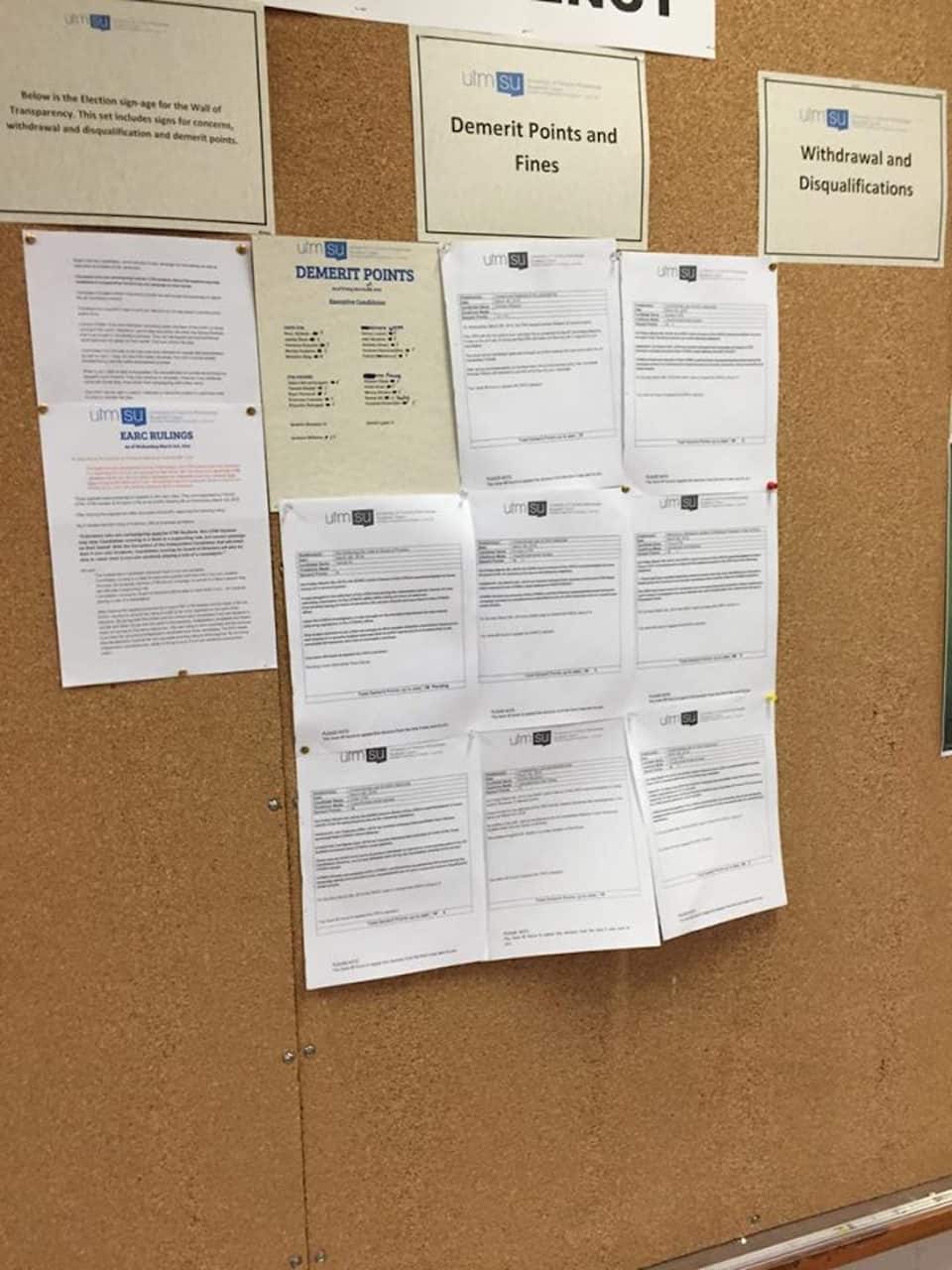After a hotly-contested campaign that saw four slates and several independent presidential candidates, the Unite UTM slate swept the University of Toronto Mississauga Students’ Union (UTMSU) elections and won every executive position by huge margins.
Voting took place on March 8, 9, and 10, with the 10 day campaign period concluding on the last day of voting.
The unofficial results were posted on UTMSU’s Facebook page on March 14. For each executive election, there were between 51 and 60 spoiled ballots and between 60 and 98 abstentions.
“My team and I were anxiously waiting for the results and when we found out that our entire slate claimed all the executive positions we were humbled, excited and grateful,” said Unite UTM presidential candidate Nour Alideeb. “We ran a strong campaign and I couldn’t be happier and more grateful to the rest of my team and dedicated volunteers who worked day in and day out to make this all happen.”
Alideeb, who is the current vice president, university affairs, was elected as president with 1717 votes, well ahead of UTM Focus candidate Ridwan Olow’s 479. Her platform includes ethical divestment, nap spaces on campus, and combatting tuition and fee increases. “Our main purpose is to unite the campus to work on the issues we all care about,” Alideeb explained. Independent candidate Andrew Williams followed with 369 votes.
Jackie Zhao, who is also the president of the Chinese Undergraduate Association, received 1,811 votes to become the next vice president, internal & services. Zhao, who received more votes than any other candidate for any position, wants to establish an emergency food plan fund, bring more lockers to campus, and create a bursary for international students.
Hoda Khan, who ran with UTM Focus, received 554 votes; EnvisionUTM candidate Adil Isaac Abrahim placed third, receiving 457 votes.
For vice president, university affairs & academics, Vanessa Demello emerged victorious with 1,808 votes.
Demello, who is an executive with The Psychology Association of Undergraduate Students at Erindale and a former orientation leader, wants to bring improved mental health services on campus. UTM Focus’ Menna Elnaka received only 467 votes, followed closely by UTM Awaken candidate Ryan Persaud’s 438 votes.
Marise Hopkins, who is the coordinator for UTMSU’s World University Services Chapter (WUSC) and chair of the WUSC local committee, will serve as vice president, external, after winning 1,612 votes. Hopkins’s platform includes heated shuttle bus shelters as well as healthier and more affordable food on campus. UTM Focus candidate Kamal M. Ali placed second with 636 votes — more votes than any other executive candidate who did not run with Unite. Amanee Nasseredine, who ran with Envision, came in third with 457 votes.
After receiving 1,732 votes, Maleeha Baig was elected as vice president, equity. Baig is the president of the Muslim Students’ Association and was previously the president of the local chapter of Amnesty International.
Baig plans to combat misogyny and build a consent-culture on campus, while lobbying for more racialized mental health counselors. Envision UTM’s Falhad Mohamoud and Focus UTM’s Farishta Amanullah followed, receiving 552 and 471 votes, respectively.
Controversies and demerit points
The rulings of the chief returning officer (CRO) and the Elections and Referenda Committee (EARC) were posted to the “Wall of Transparency” located in the Davis building and are not available online.
During the EARC meeting on March 3, UTM Focus, UTM Awaken, and Envision UTM appealed the policy that allowed non-UTM students to participate in the campaign. As a result, the EARC approved an amendment to prohibit non-UTM students from campaigning for a slate and only allow them to help in a “supporting role.”
Independent presidential candidate Ibrahim Bouteraa received 10 demerit points for reportedly campaigning in a library. Bouteraa told The Varsity that this was after a video of him passing a stack of flyers to a volunteer in the library was posted to Snapchat. “I did not know what I did is considered campaigning, but I accept the fault and have not appealed the decision,” he said.
Williams allegedly received 20 demerit points for not sending a list of volunteers and not using the pre-written recycling message on his flyers. The Medium reported that Williams’ flyers included a similar message but needed to be identical. Williams’ total demerit points were 25; it is unclear how he accrued the other five demerit points.
The CRO issued UTM Focus 10 demerit points after a non-arm’s length party reportedly “harassed and slander[ed] candidates from another Slate on multiple occasions.” The EARC eventually overturned the ruling.
All four slates also received five demerit points following allegations of at least one candidate or volunteer from each slate accessing their UTMSU email accounts.
The UTMSU’s Elections Procedure Code forbids board members, staff, volunteers, and committee members who are campaigning from accessing their UTMSU email addresses or other UTMSU resources.
“The allegations were false,” said Alideeb, explaining that she gave access to her email address to UTMSU president Ebi Agbeyegbe when she took her leave of absence.
Alideeb also claimed that the her demerit points were removed. As of March 16, the Wall of Transparency had not been updated to reflect this.
Ali, who is the director at the UTM Athletic Council (UTMAC), was issued five demerit points for allegedly collecting nomination signatures at the UTMAC office. The CRO considered this an unfair advantage, as he had access to a location that others would not have had. Ali’s demerit points, however, were changed to “pending,” with no clear reason as to why.
At press time, the CRO has not responded to The Varsity’s requests for comment.


